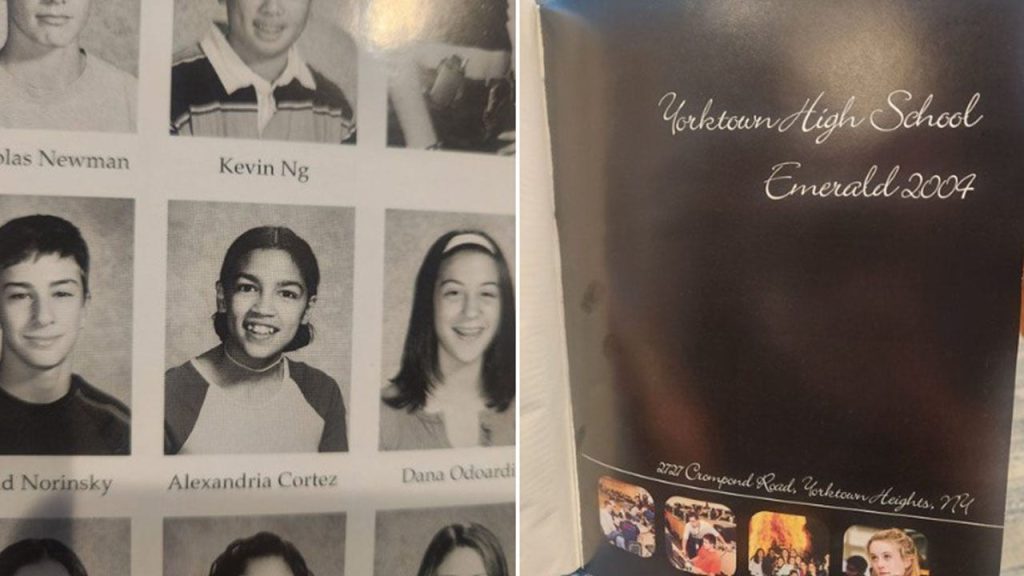In a heated exchange on social media, Rep. Alexandria Ocasio-Cortez and President Donald Trump have exchanged barbs over the congresswoman’s claims of her Bronx upbringing. New York State Assemblyman Matt Slater interjected by sharing a yearbook image of Ocasio-Cortez from her time at Yorktown High School, raising questions about her identity. The discourse highlights a larger debate about authenticity and representation in political discourse.
| Article Subheadings |
|---|
| 1) Ocasio-Cortez’s Claims of Bronx Identity |
| 2) The Social Media Spat with Trump |
| 3) A Bronx Girl or a Westchester Resident? |
| 4) Slater’s Challenge and Its Implications |
| 5) The Broader Conversation on Identity in Politics |
Ocasio-Cortez’s Claims of Bronx Identity
Rep. Alexandria Ocasio-Cortez, a prominent figure in the Democratic party, frequently refers to herself as a “Bronx girl.” This portrayal aligns with her campaign rhetoric and public persona, appealing to constituents in the Bronx and Queens, districts she represents. However, her upbringing has sparked debates regarding the authenticity of such claims.
Born in the Bronx, Ocasio-Cortez spent her formative years there until her family moved to Yorktown Heights, a suburb in Westchester County, when she was just five years old. While she has expressed pride in her Bronx roots, the transition to a more affluent suburban environment has led some critics, including Slater, to question her narrative. This complexity raises larger questions about how identity is defined and perceived in political life.
The Social Media Spat with Trump
The conflict between Ocasio-Cortez and President Trump intensified recently when Ocasio-Cortez called for Trump’s impeachment over military actions targeting Iranian nuclear facilities. Trump responded through a post on Truth Social, where he insulted her intelligence by calling her “stupid” and “one of the dumbest people in Congress.” Such exchanges are not new but have become increasingly polarized.
In her rebuttal, Ocasio-Cortez did not shy away from engaging Trump. She reacted with a series of posts on X, sharing her thoughts and defending her credibility. “Also, I’m a Bronx girl. You should know that we can eat Queens boys for breakfast. Respectfully,” she quipped, drawing on their geographic roots to bolster her argument.
A Bronx Girl or a Westchester Resident?
Amid this public feuding, Assemblyman Slater took to social media, posting an image of Ocasio-Cortez’s yearbook from Yorktown High School. His tweet—“If you’re a BX girl then why are you in my Yorktown yearbook? Give it up already”—attempted to undermine her claims of being a lifelong Bronx resident. This objection touches on a broader context affecting various politicians who have complicated backgrounds.
The counter-narrative advocates for authenticity in political identity. Individuals on both sides of the political spectrum often grapple with issues of representation and the complexities of their pasts. Ocasio-Cortez’s case highlights how narratives around identity can be construed differently, depending on the audience’s viewpoint.
Slater’s Challenge and Its Implications
Slater’s criticism reflects a growing trend where political figures challenge one another’s narratives about identity and authenticity. As a fellow Yorktown High School alumnus, his comments may hold weight in the context of shared experiences, but also deepen partisan divides. Critics argue that such attacks are less about personal truths and more about political maneuvering, especially in an election year.
Whether Slater’s challenge will gain traction among voters remains to be seen, yet it raises significant issues regarding the expectations of public figures to uphold narratives that resonate with their constituents. The conversation around Ocasio-Cortez’s identity may shift how voters perceive her authenticity as a representative of the Bronx.
The Broader Conversation on Identity in Politics
The ongoing confrontation over Ocasio-Cortez’s identity has prompted a broader discussion regarding how identity influences political support. Social media’s role in shaping public perception also cannot be ignored; it serves as a double-edged sword where immediate responses can amplify voices and, at times, lead to misinterpretations of an individual’s identity.
As debates evolve, the importance of a nuanced understanding of identity becomes increasingly paramount. Politicians across the spectrum must navigate these waters carefully, as their backgrounds can either make or break their reputations in the eyes of the voters. This instance highlights the complexities surrounding authenticity, particularly in cases involving constituents who may feel a sense of ownership over how their representatives portray themselves.
| No. | Key Points |
|---|---|
| 1 | Rep. Alexandria Ocasio-Cortez identifies as a “Bronx girl,” despite spending part of her early life in a suburban area. |
| 2 | A social media spat between Ocasio-Cortez and President Trump highlights political tensions in contemporary discourse. |
| 3 | Assemblyman Matt Slater challenges Ocasio-Cortez’s Bronx narrative by sharing her yearbook photo from Yorktown High School. |
| 4 | The incident raises broader questions around identity representation in politics and public perception. |
| 5 | This exchange emphasizes the ongoing need for nuanced discussions about authenticity and identity in the political realm. |
Summary
The recent confrontation between Rep. Alexandria Ocasio-Cortez and President Trump, interjected by Assemblyman Matt Slater, has exacerbated discussions surrounding political identity and authenticity. Ocasio-Cortez’s self-identification as a Bronx girl is questioned in light of her suburban upbringing, casting a spotlight on the complexities of understanding identity in a political context. Such exchanges illustrate the challenges representatives face in maintaining authenticity while navigating diverse community expectations.
Frequently Asked Questions
Question: What sparked the online spat between Ocasio-Cortez and Trump?
The spat began when Ocasio-Cortez called for Trump’s impeachment over military actions related to Iran, leading Trump to criticize her intelligence on social media.
Question: Who is Assemblyman Matt Slater?
Assemblyman Matt Slater is a Republican state lawmaker who publicly challenged Ocasio-Cortez’s claims of her Bronx upbringing by sharing her high school yearbook photo.
Question: Why is Ocasio-Cortez’s identity significant in political discourse?
Ocasio-Cortez’s identity relates closely to her political narrative and the constituents she represents, and it has become a focal point for discussions on authenticity in politics.


